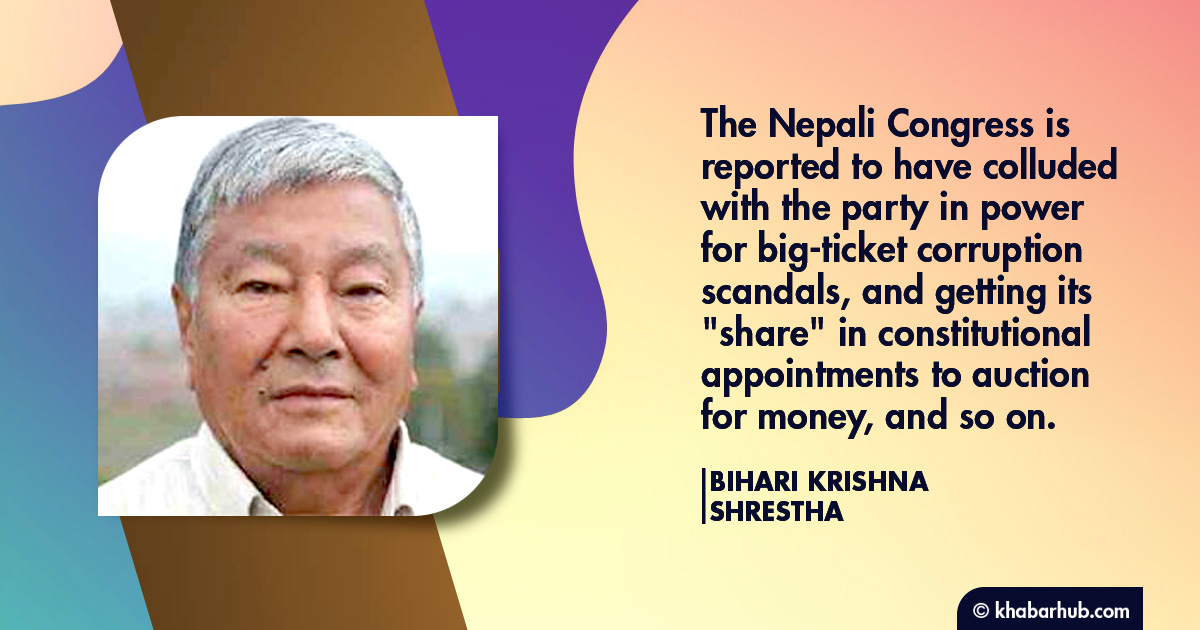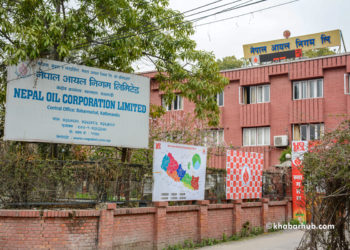While BP Koirala has been installed as a demigod by all and sundry in the Nepali Congress party and swears by his dictum even after he has been gone for nearly four decades, this is so because the party has failed to produce any other leader who even comes close to his stature in terms of such leadership attributes as intellect, visioning, commitment to democratic principles and a personality untarnished by such fallibilities as corruption.
But going by Kalyan Gurung’s interview published in the Khabarhub Nepali news portal (Oct 18), one of the many NC leaders intending to contest the presidential election during the upcoming 14th Convention of the party, it seems the rut is only to get worse.
The interview becomes even more disappointing in view of the fact that he also happens to be a former president of the party’s student affiliate, the Nepal Students’ Union, and is, therefore, expected to be relatively more erudite in thought and expression.
A major flaw on the part of both the interviewer and interviewee has been that while NC’s worst failing lately has been that it has been drenched in corruptibility, there was no question asked in this respect and Gurung himself too studiedly stayed away from this sin that has now overwhelmed not only the NC party but the entirely of the multiparty system in the country.
Some half a dozen years ago, I was asked to speak to a seminar participated by the second-ranking leaders of all major parties, including a few reputed leaders from the NC.
My framework of analysis all along has been that Nepal continues to remain a feudal society in which high caste and relative wealth assure one the status of being a local “Thalu” (feudal elite) who ascribes to himself power to extort the less fortunate village brethren and (mis)appropriate communal resources including development funds without any accountability to go with it.
It is these very “Thalus” who maintain a circle of hangers-on in his orbit based on his financial muscle and political influence, and go on to preside over various parties in the village and to represent them all the way up to the national level.
Based on this conceptual logic, I concluded in the seminar that just about every single politician in Nepal was a corrupt man or woman necessarily.
Although in opposition, the NC is reported to have colluded with the party in power for big-ticket corruption scandals like Wide Body and Narrow Body aircraft purchases, getting ones “share” in constitutional appointments to auction for money, and so on.
To my utter surprise, the 35-strong seminar found it so amusing that they all erupted in laughter. There was no offense taken.
The session showed that at least in Nepal, there was no shame associated with being corrupt in public life.
A few years before that event, I was also involved in a Sagarmatha Radio debate with two very senior politicians in the country including one from the NC.
It was the time when a seven-party alliance was launching poorly-attended protest marches against then King Gyanendra’s takeover of the reins of government.
In the course of the debate, I told them that since the parties were corrupt to the bone, the people refused to support them.
To this, the NC leader was summarily dismissive of the issue by maintaining that political corruption was not even worth talking about it as an issue.
By media report, what we know of NC leadership is that everything is bartered for money: election tickets, ambassadorial appointments, nomination in constitutional bodies, contracts, big and small, policies, big and small and so on.
Even the most progressive sounding politicians in the parties have been known to have made such illicit money.
Although in opposition, the NC is reported to have colluded with the party in power for big-ticket corruption scandals like Wide Body and Narrow Body aircraft purchases, getting ones “share” in constitutional appointments to auction for money, and so on.
As long as younger leaders like Kalyan Gurung choose not to be different from their corrupt seniors, NC, with or without the holy grail of BP’s memory, will not be a force for genuine democracy.
Kalyan Gurung surely has been witness to these serious fault lines in the party from very close quarters.
He should have used this interview as an opportunity to go into this carcinogenic malignancy in the party and assure the fellow party members and people in general how he as a presidential aspirant, would try to clean up this corruption mess once and for all.
As a candidate, he should even have been able to share the possible specific measures he would take to end this scourge in the party and possibly also in national politics.
But sad to note, he did not even make any mention of this pandemic in the party. Clearly, the nation must look far beyond the mere change of guard in the political parties.
As long as younger leaders like Kalyan Gurung choose not to be different from their corrupt seniors, NC, with or without the holy grail of BP’s memory, will not be a force for genuine democracy.
It will continue to remain a democratic farce, forcing people to look for more radical alternatives.
(The author is a former government Secretary)
The views expressed in this article are the author’s own and do not necessarily reflect Khabarhub’s editorial stance.









Comment